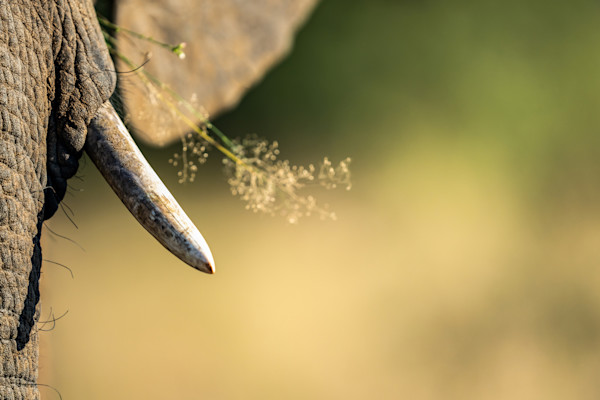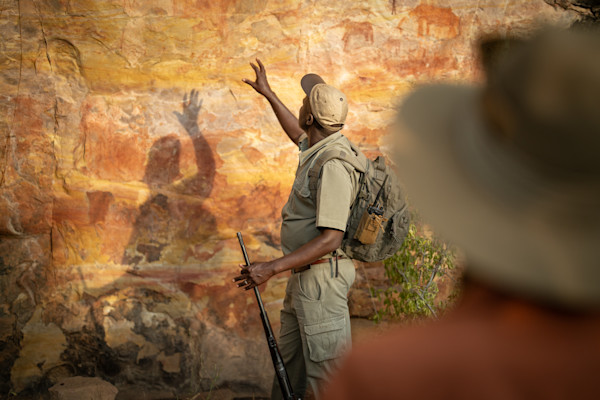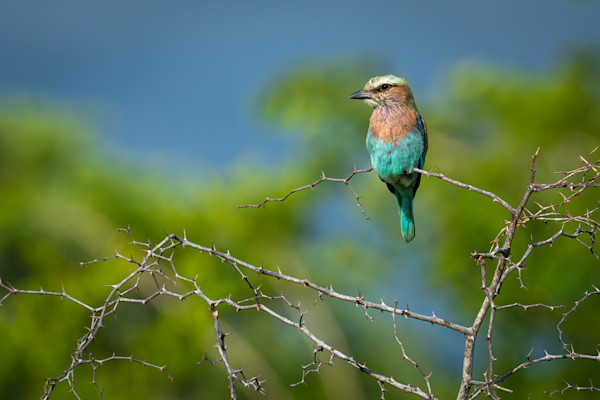
July 2024
Conservation
Experience
The Canine & Human Teams Dedicated to Securing the Serengeti
in ConservationShare:
The Canine & Human Teams Dedicated to Securing the Serengeti
Tony is not your garden-variety chocolate brown labrador (mix). He’s a powerful weapon in the fight against poaching in the Grumeti concessions in northern Tanzania.
While Tony might be very far from Virginia (in the USA), where he was surrendered to a shelter, life is one grand African adventure for him these days. Here forms part of the canine contingent of Grumeti Fund’s Anti-Poaching Unit operating in the western corridor of the Serengeti, along with his three compatriots – Belgian Malinois named Radar, DJ and Oke – and six highly skilled handlers, led by Mugoye Rugatiri, the Canine Unit Supervisor.
A strong bond between dog and human is essential to success, but Mugoye and the handlers have that covered. He says, "I have good experience with animals. I understand all of them, and they understand me.”

The human and canine team that is Grumeti Fund's Anti Poaching Canine Unit work in harmony to help protect the landscape and species of the Serengeti
Grumeti’s Formidable Canine Force
Finding solutions to poaching threats has always been challenging. In 2017, Grumeti Fund, Singita’s conservation and community development partner in Tanzania, decided to bolster its anti-poaching activities by launching the first-ever Anti-Poaching Canine Unit, with Tony, DJ and Radar as part of the original team.
Matt Perry, General Manager of the Grumeti Fund, says it’s been an effective initiative: “The K9 Unit has added huge value to our position in better securing the wildlife within the region, working in tandem with our other assets and technologies.”
With highly attuned senses, the dogs can cover huge distances and are masters of detection. "These dogs are doing an amazing job during joint patrols with our AP Scouts," says Mugoye. They are effective in detecting illegal materials, including snares, poached bushmeat, used shots, and ivory."
Matt says, "This unit's presence has significantly reduced poacher numbers – a critical component in effectively safeguarding the area."


The Canine Unit, supported by technology, has ensured great success in the fight against poaching
Leaning Into The Cause
Skyler Nuelle, Grumeti Fund’s Head of Partnerships and Impact Analysis, says fundraising for the Canine Unit is very active. Guests staying at any Singita lodge in the Serengeti are invited to donate USD500 to participate in K9 Unit training demonstrations.
She says it can be challenging to grasp the enormity of these dogs' skills, and guests are always enthralled when witnessing it firsthand. “It’s really hard to conceptualise how talented these dogs are and how quick they are in the field," she says. DJ can track a human scent that is more than 16 hours old, a skill well beyond human ability.

The dogs, with their unique skills and speed, guided by their human handlers make for a formiddable force of detection and protection
This immersive guest experience helps raise awareness and funds for Grumeti Fund’s Anti-Poaching Unit and gives visitors insight into the work being done to preserve wildlife and the Serengeti. Matt says that to understand the incredible work done by the team – now consisting of over 100 Scouts – it's important to look back and see what these “boots on the ground" have achieved.
In a recent Safari Conversations podcast, Matt talks to Singita’s Ross Couper about anti-poaching in the Grumeti Reserve. He says that 20 years ago, the landscape was devoid of resident wildlife and there wasn’t much going on in terms of wildlife protection.
“We set about moving through the 350 000 acres, working with a very small team at the time, who were all ex-poachers, and slowly but surely, we built resilience into the ecosystem so that the resident wildlife numbers could bounce back."

Devoid of abundant resident wildlife til fairly recently, the Grumeti Reserve has flourished under careful conservation, rehabilitation and protection
A Legacy of Service
Unfortunately, some have paid the highest price. One such Scout is Kitaboka Wagora, a legendary member of the Anti-Poaching Unit who was shot by a poacher in 2008 and died from his injuries.
The latest fundraising initiative between Singita and the Grumeti Fund, the Wagora MTB Ride, was named in his honour in consultation with his family. The event will raise awareness and money for Grumeti Fund’s ongoing work.
Skyler says, “Kitaboka Wagora was an exceptional Scout, known for his leadership and commitment, so it is only fitting that the ride is named after him to keep his memory and example alive. Funds raised from the ride will support Grumeti Fund’s anti-poaching teams, including the Canine Unit.”
Taking cues from the success of the yearly Serengeti Girls Run, Singita and the Grumeti Fund have launched the Wagora MTB Bike Ride so adventure-seekers from around the world can get together and ride through the magnificent landscape, which is also home to the great wildebeest migration.

The inaugural Wagora MTB Ride will take place in October to raise awareness around the invaluable work of the Grumeti Fund's Anti-Poaching Unit and funds to support its ongoing efforts
Taking place in October 2024, participants will stay at Singita Explore for five nights – a close-to-nature camp that embodies the true spirit of safari. Between riding the plains, going on game drives and connecting in their downtime, they can also interact with the anti-poaching unit and participate in various activities. It's a rare opportunity to give back to the dedicated scouts who safeguard the wildlife of the Serengeti.
Guests might even be lucky to meet Tony, DJ, Radar, and Oke and witness their awe-inspiring detection capabilities first-hand…
Be a part of this conservation legacy
Find out more about the Wagora MTB Ride, click here. If you’d like to take part from afar and help support fundraising, you can also donate to Grumeti Fund’s ongoing anti-poaching work.


